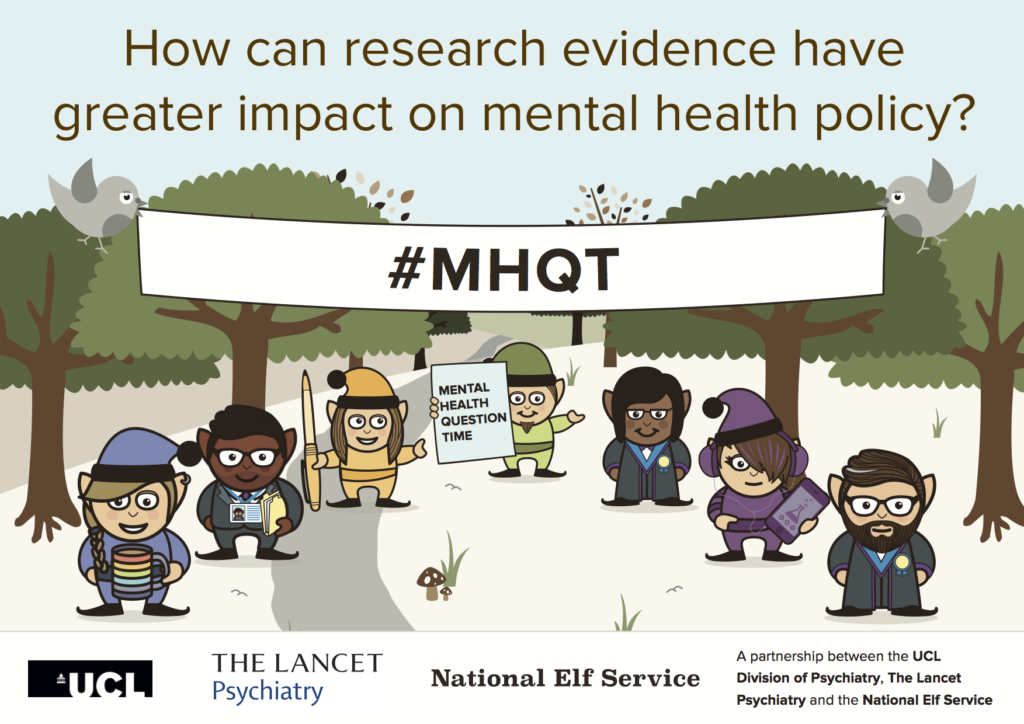
University College London (UCL) and King’s College London are leading on setting up a new policy research unit, the NIHR Mental Health Policy Research Unit, which will bring mental health researchers, clinicians, service users and carers closer together. The main aim of the unit is to provide research to inform policy makers.
Commissioned by the Department of Health through the NIHR’s Policy Research Programme following an open competition, the policy research unit will be hosted at UCL and jointly led by UCL and King’s, alongside researchers from City, University of London and Middlesex University. It is funded at a cost of £5m for five years. I am the Director of the Unit, and the co-Director is Prof Paul McCrone of King’s, with Dr Bryn Lloyd-Evans (UCL) and Dr Sian Oram (King’s) as Deputies. A team of leading researchers in a range of fields of mental health are involved, and Dr Sarah Carr (Middlesex) will lead on Patient and Public Involvement and Co-production. A team of research staff with backgrounds including clinical research, qualitative methods, statistics, informatics and health economics will sit at UCL and at King’s.
The Policy Research Unit will bring mental health researchers, clinicians, service users and carers closer together, to provide research to inform policy makers.
Across the health care system, we know more about what works than is actually put into practice. Policy makers rarely have the latest research findings readily available, and key research questions often take much too long to answer for the policy timescale. We hope that we will be able to help policy makers, including Department of Health officials and key NHS England and Public Health England decision makers, to get access to relevant evidence that can help them make the best use of scarce resources. We will also be able to provide new evidence in response to high priority policy questions. Within our resources and timescales, we won’t be able to do very large-scale primary data collection, but we expect to be able to produce new evidence by methods such as bespoke analyses of existing data, including large public data sets, evidence syntheses and rapid qualitative case studies.
We will have a responsive core team, with staff already in place at UCL and King’s, and will be able to provide rapid response and signposting to experts where quick answers are needed. We are building up a broad network of experts to help ensure that policy makers will have access to the most comprehensive and up-to-date evidence to guide their plans, and we very much hope to be a channel by which researchers across the country can make sure their important policy-relevant findings have an impact. Our focus will be on prevention, access and quality across the whole field of mental health (though not dementia and intellectual disability), so that we do have a very broad remit. In some instances, we will seek experts outside our core group to take on short-term projects to which their expertise is relevant. We also have some very important collaborators beyond academia including the Mental Elf himself and the Centre for Mental Health: we hope that this will help us make sure that our findings and reports are widely disseminated, and there are many dialogues between our team and the whole range of stakeholders in the field of mental health research.
A network of Policy Research Units already exists to provide the Department of Health with evidence in areas including Children and Young People and Women’s Health, but this is the first such unit in mental health.

The focus of the Mental Health Policy Research Unit will be on the prevention of mental illness, access to services and quality of care.
We are pleased that the Department of Health are funding the NIHR Mental Health Policy Research Unit. This presents a unique opportunity for the academic community to work closely with clinicians and service users in influencing and supporting mental health policy over the coming years. A major strength of the unit is its multi-disciplinary focus, bringing together quantitative and qualitative research, implementation science, and my own field of health economics.
– Professor Paul McCrone (King’s College London), co-director of the unit.
People who have used mental health services, some of whom are professional researchers, will be part of the team and will contribute their perspectives on equal terms. The unit’s research priorities will be set by the Department of Health and affiliated bodies, and the research team will be collaborating with all stakeholder groups to determine how to address them. We are currently establishing a core PPI group and our aim is that each substantial piece of work we undertake will have its own lived experience group, with co-production principles followed wherever this is feasible, especially in work that involves investigating service models or stakeholder experiences and views.
The unit is committed to maintaining a national focus thanks to a steering group hailing from across the country and by monitoring for regional inequalities, alongside other inequalities of all kinds.
Some quotes about aspirations for the new Unit:
Mental health is a major priority for this Government. We are working hard to put mental and physical health on an equal footing and have put record funding in mental health services. This new research unit will bring together a team of high calibre researchers to help government make the right, evidence-based decisions for people with mental health issues.
– Health Minister, Lord O’Shaughnessy.We are proud and delighted to host the NIHR Mental Health Policy Research Unit at UCL. Mental health is a key strategic priority of our faculty and is an area in which we have many exciting new initiatives. We are committed to making a positive impact with our research and improving the lives and prospects of people affected by mental health disorders. The unit will be receiving valuable input from people across the university, including some of world’s foremost mental health researchers.
– Professor Alan Thompson, Dean, UCL Faculty of Brain Sciences.
Follow the new NIHR Mental Health Policy Research Unit on Twitter.
The Mental Health Policy Research Unit will be officially launched at our next Mental Health Question Time event in London on Wednesday 29th November. Free tickets will be made available for that event very soon.

Our next Mental Health Question Time will focus on evidence and mental health policy making.
Photo credits
- Photo by Dmitry Ratushny on Unsplash
- Photo by rawpixel.com on Unsplash
- Photo by Stefan Cosma on Unsplash

This sounds worrying to me. We have already seen how spun results and poorly conducted UK mental health research has harmed the way sick and disabled people are treated in this country. Spun evidence has allowed government ministers to claim that policies and cuts which have gone on to be condemned by the UN Committee on the Rights of Disabled Persons for leading to “grave and systematic violations” of disabled people’s rights are in fact ‘evidence based’ and empowering.
KCL and Paul McCrone have been at the heart of a key example of the sort of misleading ‘evidence’ which distorts how policy makers understand disability, ill health and rehabilitation. The £5 million PACE trial is the only medical research to have received funding from the DWP and, after patients led the way in raising concerns, has been picked apart by international researchers (even if some in the UK MH community attempt to ignore this inconvenient fact).
McCrone was the corresponding author of the PACE trial paper published at PLoS, and so should have been able to make the data underlying his research available for independent scrutiny: https://www.ncbi.nlm.nih.gov/pubmed/22870204#cm22870204_13300
However, when this data was requested McCrone and KCL chose to present the data request as a ‘vexatious’ freedom of information request, telling Dr Coyne that: “The university considers that there is a lack of value or serious purpose to your request. The university also considers that there is improper motive behind the request. The university considers that this request has caused and could further cause harassment and distress to staff.” They went on to argue that “the active campaign to discredit the project has caused distress to the university’s researchers who hold legitimate concerns that they will be subject to public criticism and reputational damage.” https://web.archive.org/web/20160314024024/https://dl.dropboxusercontent.com/u/23608059/PACE%20F325-15%20-%20Prof.%20James%20Coyne%20-%20Response-2.pdf
This followed long-running attempts by the PACE team to avoid the release of results for outcomes which had been laid out in their published protocol, and to dismiss critics of their work without engaging in meaningful debate. Fortunately, a patient was willing to make great personal sacrifices, and take on the PACE researcher’s £250,000 legal team to win access to some data from the PACE trial at an Information Tribunal: http://www.centreforwelfarereform.org/news/major-breaktn-pace-trial/00296.html
The release of this data further underlined how seriously results had been misrepresented by the PACE trial’s researchers: https://www.nytimes.com/2017/03/18/opinion/sunday/getting-it-wrong-on-chronic-fatigue-syndrome.html
In the PACE trial the addition of CBT to patients medical care was associated with some improvements in subjective self-report outcomes for fatigue and disability (after participants were told mid-trial that CBT had been already been shown to be effective), but there was no association with improvement in any of the more objective outcomes used in the trial (a walking test, employment data, and a fitness test). This should have led to caution in any claims made about the benefits of CBT, but instead the PACE trial researchers have played down the importance of their objective outcomes and chose to abandon the pre-specified analyses from their protocol for their subjective self-report outcomes, choosing to present them instead in ways which led to hugely exaggerated claims of success.
Unfounded or exaggerated claims about the efficacy of ‘rehabilitation’ harms patients by distorting their decisions about their own healthcare, but also through social mechanisms, by altering the way in which their health problems are understood, and the way in which resources are allocated. The use of subjective self-report outcomes in nonblinded trials is not seen as acceptable when it comes to alternative medicine, or pharmaceutical trials, yet when it comes to claims about ‘rehabilitation’, particularly when targeting those with stigmatised conditions, standards seem to be lowered. UK policy makers have been convinced that they should move resources away from potentially disincentivising direct payments to impoverished disabled people, and towards payments to relatively privileged NHS workers who claim they can provide empowering rehabilitation.
When Lord Freud was in the House of Lords, presenting the ‘biopsychosocial model’ as providing the philosophical underpinning of the government’s replacement of Disability Living Allowance with the less generous Personal Independence Payments, he cited a document co-authored by Mansel Aylward, the DWP’s CMO, who sat as an observer on the PACE trial’s steering committee. This document argued that, for common physical and mental health problems, a sick-role re-conceptualised under the biopsychosocial model now meant that benefit claimants were obligated to recognise “that the sick role is temporary, in the expectation of recovery” and to be “motivated and cooperate with rehabilitation”: http://www.webility.md/praxis/downloads/Models-of-Sickness-Disability-Waddell-and-Aylward-2010-2.pdf
http://ueaeprints.uea.ac.uk/58235/1/1351_Shakespeare.pdf
The release of data from the PACE trial showed that, when using the outcome measure laid out in the trial’s published protocol, the addition of biopsychosocial rehabilitation to CFS patient’s medical care failed to lead to a significant difference in recovery rates. In contrast to the claims made by the PACE trial’s researchers, it seems that patients have no reason to expect their motivated cooperation with rehabilitation would lead to recovery.
I’ve yet to see McCrone display an understanding of the problems with the research he was promoting, or the role that he played in attempts to smear patients concerned that misleading claims were being made which served to harm them, and others.
Does he now understand the problems with what was done here? Or does he feel able to defend the PACE trial in open debate? If he is not able to do either, why would anyone think that he is a suitable choice for this new position? Why would patients aware of the problems with his work, and the way he has responded to concerns, feel comfortable working with the NIHR Mental Health Policy Research Unit?
The problems with MH researchers exaggerating the value of their work, downplaying potential problems with the biasing of subjective self-report outcomes in nonblinded trials, and evading debate with critics of their work, have all played into the harmful culture which surrounds the UK’s political approach to ill health and disability. These are problems which a unit committed to using evidence to guide policy makers back to reality would need to focus on. Will McCrone be committed to debunking his own work?
For those who have faced years of poverty, prejudice and smears as a result of the actions of McCrone and his colleagues, talk of concern about “inequalities of all kinds” is difficult to take seriously.
Congratulations, Sonia and team! From a UCL graduate.
[…] distinguished by quite a close relationship to research. The main source of this has been the new NIHR Mental Health Policy Research Unit (MHPRU), introduced to readers of the Mental Elf at the time of its launch just over a year ago. The MHPRU, […]